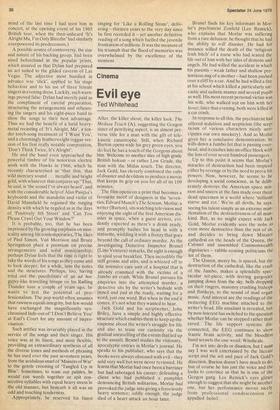Cinema
Evil eye
Ted Whitehead
After, the killer shout, the killer look. The Medusa Touch (A), suggesting the Gorgon sister of petrifying aspect, is an almost per
verse title for a man with the gift of telekinetic catastrophe. Still, when Richard Burton opens wide his grey green eyes, you do feel he has a touch of the Gorgoni about him. Welcome to another slice of high grade British hokum — or rather Lew Grade, the ' man with the Midas touch. The director, Jack Gold, has cleverly combined the cults of disaster and devildom to produce a movie that keeps its grip on you for all of its 109 minutes.
The film opens on a print that becomes a favourite motif of designers in the 'seven
ties, Edvard Munch's The Scream. Morlar, a writer (Burton), sits watching television and
enjoying the sight of the first American dis aster in space, when a guest arrives, evidently expected as there's a drink ready, and promptly bashes his head in with a statuette, wielding it with a frenzy that goes beyond the call of ordinary murder. As the investigating Detective Inspector Brunel (Lino Ventura) remarks, the sight is enough to spoil your breakfast. Then incredibly the stiff groans and stirs, and is whizzed off to the intensive care unit of a hospital that is already crammed with the victims of a Jumbo air crash. While Brunel pursues his enquiries into the attempted murder, a detective sits by the writer's bedside with pencil and pad at the ready, waiting for a word, just one word. But when in the end it comes, it's not what they wanted to hear.
Jack Gold and his scriptwriter, John Briley, have a simple and highly effective structure which enables them to keep up the suspense about the writer's struggle for life and also to tease our curiosity via the gradual unravelling of the events that led up to the assault. Brunel studies the visionary, apocalyptic entries in Morlar's journal. He speaks to his publisher, who says that the books were always obsessed with evil — they sold very well but were never reviewed. He learns that Morlar had once been a barrister but had sabotaged his career; defending a client who had published a pamphlet denouncing British militarism, Morlar had provoked the judge into giving a ferociously heavy sentence; oddly enough, the judge died of a heart attack an hour later.
Brunel finds his key informant in Morlar's psychiatrist Zonfeld (Lee Remick),
who explains that Morlar was suffering
from a rare delusion: he thought that he had the ability to will disaster. He had for
instance willed the death of the 'religious Irish bitch' of a nurse who had scared the life out of him with her tales of demons and angels. He had willed the accident in which his parents — weak father and shallow pretentious nag of a mother — had been pushed over a cliff by a car. And he had willed a fire at his school which killed a particularly sarcastic and sadistic master and several pupils
as well. His most recent personal victim was his wife, who walked opt on him with her lover; later that evening, both were killed in a car crash.
In response to all this, the psychiatrist had offered sedatives and scepticism (the scepticism of various characters nicely anticipates our own mockery). And so Morlar gives her a conclusive demonstration: he wills down a Jumbo-Jet that is passing overhead, and it crashes into an office block with the loss of over seven hundred passengers. Up to this point it seems that Morlar's miracles of destruction had been inspired either by revenge or by the need to pro% e his powers. Now, however, he seems to be developing a social conscience, as he deliberately destroys the American space mission and sneers at the fuss made over three dead spacemen in a world where 'millions starve and rot.' We're all devils, he says, seeing his talent simply as an extreme manifestation of the destructiveness of all mankind. But, as we might expect with Jack Gold, Morlar evidently sees the nobs as even more destructive than the rest of us, and decides to bring down Minster cathedral on the beads of the Queen, the Cabinet and assembled Commonwealth dignitaries — rabble-rousing politicians the lot of them.
The Queen, mercy be, is spared, but the destruction of the cathedral, like the crash of the Jumbo, makes a splendidly spectacular set-piece, with leering gargoyles jumping down from the sky, bells dropping on their ringers, masonry crushing bishops and flunkeys, to the sound of mad organ music. And intercut are the readings of the twittering EEG machine attached to the writer's head. His assailant is revealed, but by now interest has switched to the question whether Morlar can be stopped rather than saved. The life support systems disconnected, the EEG continues to shoo/ frantic brain activity, and the bloodless hand scrawls the one word: Windscale.
I'm not into devils or disasters, but 1 must say I was well entertained by the literate script and the wit and pace of Jack Gold's direction. Burton doesn't have much to do, but of course he has just the voice and the looks to convince us that he is one of the Gorgon gang. Lee Remick's eyes glitter enough to suggest that she might be another one, but her performance moves nicely from professional condescension to appalled belief.














































 Previous page
Previous page